
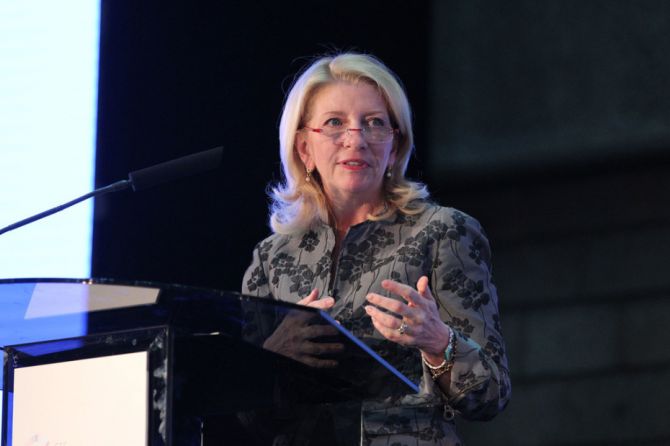
Press Statement
UNAIDS welcomes the appointment of Catherine Russell as the new Executive Director of UNICEF
20 December 2021 20 December 2021GENEVA, 17 December 2021–UNAIDS welcomes the announcement from the United Nations Secretary-General António Guterres of the appointment of Catherine Russell as the new Executive Director of UNICEF. Ms Russell will begin her new role in January 2022, taking over from Henrietta Fore who held the position since January 2018.
“We extend our heartfelt thanks to Henrietta Fore for her inspirational work on behalf of the world's children and warmly welcome Catherine Russell as UNICEF’s new Executive Director,” said Winnie Byanyima, Executive Director of UNAIDS. “We look forward to working closely with Ms Russell in our fight to end inequalities and end AIDS among children.”
Despite medicine being available to prevent HIV infection among children, in 2020, around 150 000 children became newly infected with the virus, bringing the total number of children living with HIV around the world to 1.7 million. In 2020, while 74% of adults aged 15 years and older living with HIV had access to treatment, just 54% of children aged 0–14 years had access to the life-saving medicine.
UNICEF and UNAIDS work together to ensure all children are born free from HIV, and that all children and adolescents living with, and affected by HIV have access to the treatment, care and support they need to thrive.

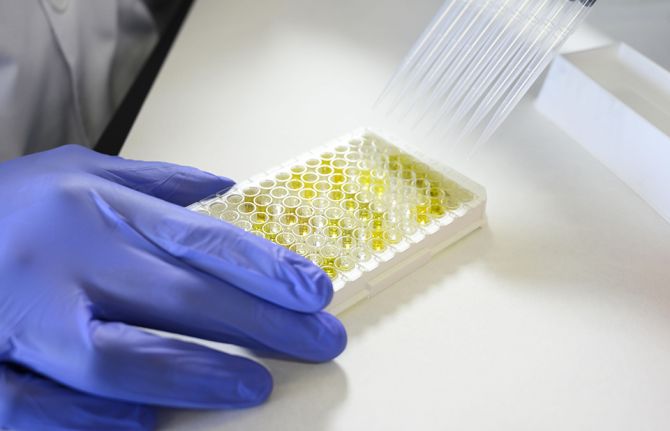
Press Statement
UNAIDS welcomes the first WHO COVID-19 Technology Access Pool licensing agreement
24 November 2021 24 November 2021GENEVA, 24 November 2021—UNAIDS welcomes the first licensing agreement under the World Health Organization (WHO) COVID-19 Technology Access Pool (C-TAP) initiative, negotiated between Consejo Superior de Investigaciones Científicas (Spain’s High Council of Scientific Research) and the Medicines Patent Pool.
The C-TAP initiative builds on a successful model to increase access to HIV, tuberculosis and hepatitis C products in low- and middle-income countries and has proved to be effective in overcoming some barriers to access to health technologies for COVID-19. However, the initiative has so far been underutilized, and pharmaceutical companies and other holders of COVID-19 technologies have been reluctant to join C-TAP.
“I welcome this new agreement, but urge other pharmaceutical companies and COVID-19 technology-holders to share their know-how,” said Winnie Byanyima, Executive Director of UNAIDS. “Think of how many lives could be saved if COVID-19 vaccines, medicines and other technologies were available through this mechanism to everyone who needs them.”
The new licensing agreement shows that it is possible to share knowledge, technology and intellectual property rights in the fight against COVID-19.
The sharing of intellectual property rights, data and know-how should be a fundamental component of pandemic preparedness and response. UNAIDS encourages research institutes and holders of life-saving technologies, including vaccine manufacturers, to follow suit and join C-TAP and urges the governments of countries that host pharmaceutical companies to ensure that their technologies are offered to C-TAP as a matter of urgency.
The agreement contains key access provisions, such as the non-exclusive right to develop the licensed patents, know-how and material. There is no geographical limitation, so qualified companies worldwide will be able to develop the licences and commercialize the products derived from them. The terms of the agreement will be publicly available, ensuring transparency. The agreement includes a technology transfer package.
The agreement covers the licensing of a technology to detect antibodies to SARS-CoV-2, the virus that causes COVID-19, from either COVID-19 infection or a vaccine, and will allow the measurement of the effectiveness of vaccination programmes and help in the management of vaccination booster programmes. The tests derived from the technology are simple to use, which will allow their application in resource-limited settings, and companies based in low- and middle-income countries will not have to pay royalties for the technology’s use.
UNAIDS was a supporter of a call for action in May 2020, led by the Government of Costa Rica and WHO, which led to the setting up of C-TAP. UNAIDS is a member of the C-TAP Steering Committee.
UNAIDS thanks the Government of Spain for backing and facilitating the agreement and for its financial support of C-TAP.
UNAIDS
The Joint United Nations Programme on HIV/AIDS (UNAIDS) leads and inspires the world to achieve its shared vision of zero new HIV infections, zero discrimination and zero AIDS-related deaths. UNAIDS unites the efforts of 11 UN organizations—UNHCR, UNICEF, WFP, UNDP, UNFPA, UNODC, UN Women, ILO, UNESCO, WHO and the World Bank—and works closely with global and national partners towards ending the AIDS epidemic by 2030 as part of the Sustainable Development Goals. Learn more at unaids.org and connect with us on Facebook, Twitter, Instagram and YouTube.

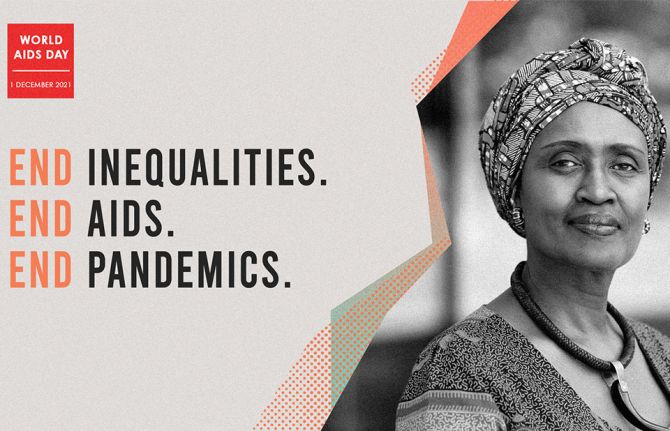
Press Statement
World AIDS Day 2021 message from UNAIDS Executive Director Winnie Byanyima
01 December 2021 01 December 2021Dear friends,
Greetings on this World AIDS Day, and my solidarity with all around the world as we confront the impact of colliding pandemics.
This year, the world agreed on a bold plan that, if leaders fulfil it, will end AIDS by 2030. That’s so exciting.
But today we, as the Joint United Nations Programme on HIV/AIDS, issue a stark warning. AIDS remains a pandemic, the red light is flashing and only by moving fast to end the inequalities that drive the pandemic can we overcome it.
Where leaders are acting boldly and together, bringing together cutting-edge science, delivering services that meet all people’s needs, protecting human rights and sustaining adequate financing, AIDS-related deaths and new HIV infections are becoming rare.
But this is only the case in some places and for some people.
Without the inequality-fighting approach we need to end AIDS, the world would also struggle to end the COVID-19 pandemic and would remain unprepared for the pandemics of the future. That would be profoundly dangerous for us all.
Progress in AIDS, which was already off track, is now under even greater strain as the COVID-19 crisis continues to rage, disrupting HIV prevention and treatment services, schooling, violence prevention programmes and more.
On our current trajectory, we aren’t bending the curve fast enough and risk an AIDS pandemic lasting decades. We have to move faster on a set of concrete actions agreed by United Nations Member States to address the inequalities that are driving HIV.
Through fighting the AIDS pandemic, we have learned a lot about what we need more of for AIDS and for all pandemics.
We urgently need sufficient community-led and community-based infrastructure as part of a strong public health system, underpinned by robust civil society accountability.
We need policies to ensure fair and affordable access to science.
Every new technology should reach each and everyone who needs it without delay.
We need to protect our health workers and expand their numbers to meet our urgent needs.
We must protect human rights and build trust in health systems.
It is these that will ensure we close the inequality gaps and end AIDS. But they are too often applied unevenly, are underfunded and are underappreciated.
I salute the front-line communities that have pioneered the approaches shown to be most effective, that have driven the momentum for change and that are pushing leaders to be bold. I urge you: keep pushing.
World leaders must work together urgently to tackle these challenges head-on. I urge you: be courageous in matching words with deeds.
There is not a choice to be made between ending the AIDS pandemic that is raging today and preparing for the pandemics of tomorrow. The only successful approach will achieve both. As of now, we are not on track to achieve either.
If we take on the inequalities that hold back progress, we can deliver on the promise to end AIDS by 2030. It is in our hands.
Every minute that passes, we are losing a precious life to AIDS. We don’t have time.
End inequalities. End AIDS. End pandemics.
Thank you.
UNAIDS
The Joint United Nations Programme on HIV/AIDS (UNAIDS) leads and inspires the world to achieve its shared vision of zero new HIV infections, zero discrimination and zero AIDS-related deaths. UNAIDS unites the efforts of 11 UN organizations—UNHCR, UNICEF, WFP, UNDP, UNFPA, UNODC, UN Women, ILO, UNESCO, WHO and the World Bank—and works closely with global and national partners towards ending the AIDS epidemic by 2030 as part of the Sustainable Development Goals. Learn more at unaids.org and connect with us on Facebook, Twitter, Instagram and YouTube.

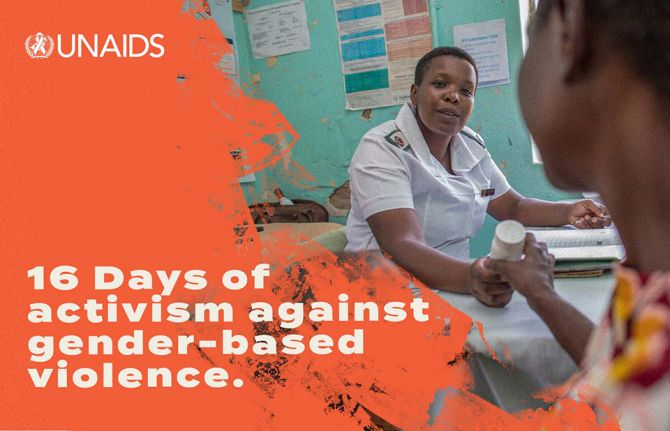
Press Statement
UNAIDS Executive Director urges action to turn the tide on violence against women and girls and HIV
24 November 2021 24 November 2021“Ending gender-based violence requires a whole-of-government, whole-of-society approach. But I am convinced that if decision-makers, at a minimum, push on these key actions, we will have a win–win for everyone: less violence against women and girls and fewer women and girls acquiring HIV or falling through the cracks in accessing and staying on antiretroviral therapy. We must revolutionize the ways of doing business in the AIDS response. Gender equality and women’s rights must be at the centre. There is no room for complacency or acceptance of gender-based violence if we are to end AIDS as a public health emergency by the 2030 deadline for achieving the Sustainable Development Goals,” said Winnie Byanyima, Executive Director of UNAIDS.
One in three women and adolescent girls around the world endure physical and/or sexual violence from their husbands, male partners or strangers. This violence takes place in their homes and neighbourhoods, where they should be safest. And this staggering statistic doesn’t count the millions more women and girls facing a myriad of other forms of gender-based violence and harmful practices. Under COVID-19, reports of intimate partner violence, child and forced marriage, female genital mutilation and sexual violence have only increased.
For women and girls living with HIV, the risks of violence multiply, including from their intimate partners, families and communities or when they seek services. Among its many consequences and costs, gender-based violence undermines hard-won gains in preventing HIV and ending AIDS as a public health emergency.
In countries with high HIV prevalence, intimate partner violence can increase the chances of women acquiring HIV by up to 50%. Violence or the fear of it blocks women’s access to services and their ability to negotiate condom use with perpetrators, disclose their HIV status or stay on HIV treatment.
Many women living with HIV also experience discrimination and sexual and reproductive rights violations in health facilities. Female sex workers, women who use drugs and bisexual and transgender people face exceptionally high risks of both HIV and gender-based violence and sexual assault, fuelled by HIV-related stigma, discrimination and criminalization.
Five key actions
In line with the United Nations General Assembly Political Declaration on HIV and AIDS: Ending Inequalities and Getting on Track to End AIDS by 2030, Ms Byanyima urges governments, United Nations agencies, donors, service providers and all stakeholders in the HIV response to immediately and systematically address the interlinkages of HIV and violence against women and girls, in all their diversity, including by:
- Getting with the basics: at a minimum, countries should comply with international standards for health-service provision for women and girls living with or at higher risk of HIV, integrating prevention and response measures to gender-based violence across HIV services, including for women from key populations, and ensuring protection of sexual and reproductive health and rights.
- Starting early on HIV and gender-based violence prevention: work with adolescent girls and boys to tackle harmful gender norms by investing in gender-transformative education and interventions, including comprehensive sexuality education, instilling values of respect for bodily autonomy, sexual consent, safe dating and use of condoms as the norm, and ensuring zero tolerance for gender-based violence and HIV stigma and discrimination in schools.
- Going beyond engaging men to seek HIV services: leverage HIV programmes engaging men and boys to incorporate gender-transformative approaches that challenge harmful masculinities fuelling both HIV and violence against women and girls. Men and boys should be engaged in HIV testing and treatment uptake alongside efforts to ensure respect of women’s sexual and reproductive health and rights and their rights to be free of gender-based violence.
- Ending impunity for violence against women and girls living with HIV: fast-track legal reforms and enforcement to uphold the human rights of all women to live free from violence, regardless of their HIV status or any other grounds, and end the overuse of criminal laws that target or disproportionately impact on women because of their sexuality, sexual activity, HIV status, gender or drug use. Expand legal and human rights literacy among women and girls living with or at risk of HIV so they know their rights and where to seek legal aid and access justice, and ensure that complaint and redress mechanisms for gender-based violence and reproductive rights violations are accessible across health and other services.
- Investing in women’s leadership to turn the tide on both HIV and gender-based violence: institute mechanisms for the meaningful participation and leadership of women and girls living with and at risk of HIV, in all their diversity, in decision-making for responding to the twin pandemics of AIDS and violence against women and girls. Invest in feminist leadership and women-led HIV community-based interventions, and value their experiences and expertise as central to an effective HIV response.
UNAIDS
The Joint United Nations Programme on HIV/AIDS (UNAIDS) leads and inspires the world to achieve its shared vision of zero new HIV infections, zero discrimination and zero AIDS-related deaths. UNAIDS unites the efforts of 11 UN organizations—UNHCR, UNICEF, WFP, UNDP, UNFPA, UNODC, UN Women, ILO, UNESCO, WHO and the World Bank—and works closely with global and national partners towards ending the AIDS epidemic by 2030 as part of the Sustainable Development Goals. Learn more at unaids.org and connect with us on Facebook, Twitter, Instagram and YouTube.

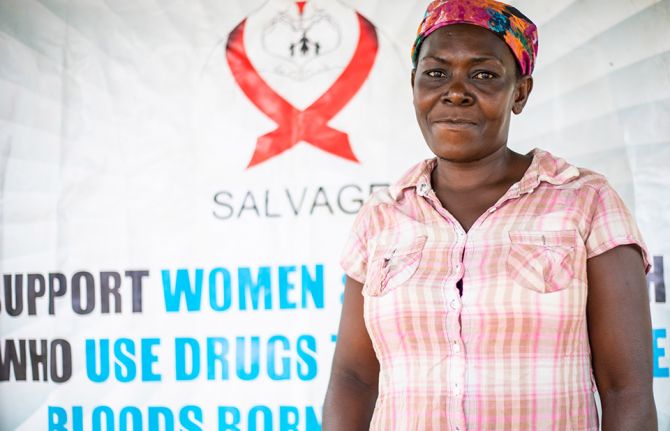
Press Statement
On International Drug Users’ Day, UNAIDS calls for action against the criminalization of people who use drugs and for community-led harm reduction programmes
01 November 2021 01 November 2021GENEVA, 1 November 2021—On International Drug Users’ Day, UNAIDS is calling for urgent action against the criminalization of people who use drugs, for the redress of criminalization’s negative effects on HIV, viral hepatitis and other health issues, for the respect of human rights and for more funding for community-led harm reduction programmes.
“UNAIDS is committed to supporting countries in their journey towards the decriminalization of drug possession and to full-scale implementation of harm reduction programmes,” said UNAIDS Executive Director, Winnie Byanyima. “UNAIDS calls for the full involvement of communities of people who use drugs in achieving legal reform aimed at decriminalization and in the organization of harm reduction programmes at the country level. This will help us to end inequalities and end AIDS.”
People who use and inject drugs are among the groups at highest risk of acquiring HIV but remain marginalized and often blocked from accessing health and social services. In 2020, 9% of all new HIV infections were among people who inject drugs. Outside of sub-Saharan Africa this rises to 20%. Although women represent less than 30% of the number of people who use drugs, women who use drugs are more likely to be living with HIV than their male counterparts.
Timely introduction and full-scale implementation of accessible harm reduction programmes can prevent HIV infections, as well as many cases of viral hepatitis B and C, tuberculosis and drug overdose. The United Nations system is united in promoting harm reduction services and decriminalization of personal possession of drugs, based on the evidence that harm reduction and decriminalization provide substantial public and personal health benefits and do not increase the number of people with drug dependency. Despite this position, reflected in the United Nations system common position supporting the implementation of the international drug control policy through effective inter-agency collaboration, in reality less than 1% of people who inject drugs live in countries with the United Nations-recommended levels of coverage of needles, syringes and opioid substitution therapy, and the funding gap for harm reduction in low- and middle-income countries sits at a dismal 95%.
Even where harm reduction services are available, they are not necessarily accessible. Punitive drug control laws, policies and law enforcement practices have been shown to be among the largest obstacles to health care in many countries. Criminalization of drug use and harsh punishments (such as incarceration, high fines or removal of children from their parents) discourage the uptake of HIV services, drive people underground and lead to unsafe injecting practices, and increase the risk of overdose. Women who use drugs face higher rates of conviction and incarceration than men who use drugs, contributing to the increased levels of stigma and discrimination they face in health-care settings. In effect, criminalization of drug use and possession for personal use significantly and negatively impact the realization of the right to health.
Earlier this year, United Nations Member States set bold global targets on decriminalization of drug possession for personal use and on elimination of stigma and discrimination against people who use drugs and other key populations. To reach these targets by 2025, strategic actions at the country level need to start today.
GLOBAL AIDS SOCIETAL ENABLER TARGETS 2025
- Less than 10% of countries criminalize drug use and possession of small amounts of drugs.
- Less than 10% of people who use drugs report experiencing stigma and discrimination.
- Less than 10% of people who use drugs lack mechanisms for people living with HIV and key populations to report abuse and discrimination and seek redress.
- Less than 10% of people who use drugs lack access to legal services.
- Less than 10% of health workers and law enforcement officers report negative attitudes towards people who use drugs.
- Less than 10% of people who use drugs experience physical or sexual violence.
GLOBAL PREVENTION TARGETS 2025
- 90% of people who inject drugs have access to comprehensive harm reduction services integrating or linked to hepatitis C, HIV and mental health services
- 80% of service delivery for HIV prevention programmes for people who use drugs to be delivered by organizations led by people who use drugs
International Drug Users’ Day
1 November is International Drug Users’ Day, when the global community of people who use drugs comes together to celebrate its history and affirm the rights of people who use drugs. The International Network of People who Use Drugs (INPUD) marks this day with a celebration of its diverse, vibrant communities’ accomplishments, while also acknowledging their work is more critical than ever.
UNAIDS
The Joint United Nations Programme on HIV/AIDS (UNAIDS) leads and inspires the world to achieve its shared vision of zero new HIV infections, zero discrimination and zero AIDS-related deaths. UNAIDS unites the efforts of 11 UN organizations—UNHCR, UNICEF, WFP, UNDP, UNFPA, UNODC, UN Women, ILO, UNESCO, WHO and the World Bank—and works closely with global and national partners towards ending the AIDS epidemic by 2030 as part of the Sustainable Development Goals. Learn more at unaids.org and connect with us on Facebook, Twitter, Instagram and YouTube.

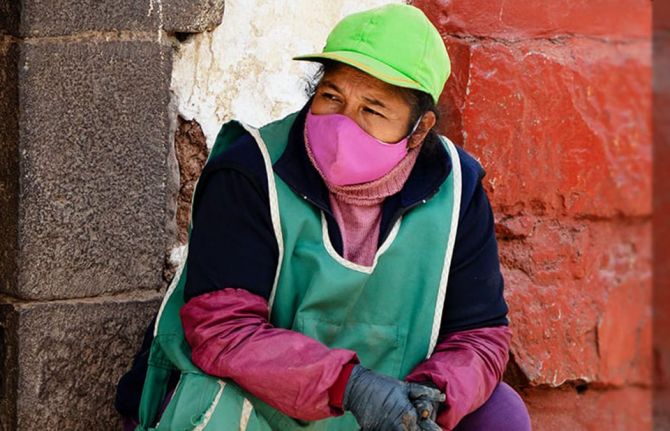
Press Statement
UNAIDS welcomes landmark agreement between Medicines Patent Pool and Merck Sharp and Dohme
28 October 2021 28 October 2021GENEVA, 28 October 2021—UNAIDS welcomes the agreement between the Medicines Patent Pool (MPP) and the pharmaceutical company Merck Sharp & Dohme through which the intellectual property rights over an antiviral medicine to treat mild to moderate forms of COVID-19 in adult patients are shared with interested sub-licensees on a non-exclusive and transparent basis. The new medicine, molnupiravir, is still pending regulatory approval but has obtained optimal results in clinical trials.
“This agreement is a good first step, where public health has been prioritized over profits,” said the Executive Director of UNAIDS, Winnie Byanyima. “This new treatment promises to be a valuable addition in the response to COVID-19 and access to it will be considerably widened by allowing companies from around the world to produce more affordable versions of the medicine.”
This is the first licensing agreement on a COVID-19 tool to be established within a public health perspective. It is a significant development considering the lack of medicines to treat COVID-19. The initiative will allow the entry into market of more affordable generic versions of this medicine as soon as it is granted authorization from national and/or regional health regulatory bodies or included in the World Health Organization (WHO) list for emergency use.
According to the agreement, pharmaceutical companies based anywhere in the world that are interested and qualified to manufacture generic versions of the product will be allowed to commercialize the medicine in the 105 countries included in the geographic scope of the licensing agreement. Nevertheless, recognizing that COVID-19 knows no geographic boundaries, UNAIDS expects that all countries suffering the disease burden will have access to the generic market for this product. All health technologies should be considered global public goods.
This agreement includes all sub-Saharan countries, all low-income countries, the majority of lower-middle-income countries and 20 upper-middle-income countries.
Originally established to negotiate public health-oriented licensing agreements for HIV, tuberculosis and malaria products, the MPP has been an important player in the HIV response by promoting competition within the pharmaceutical market and helping to push down the prices of essential medicines. UNAIDS and MPP are both members of the steering committee of the WHO COVID-19 Technology Access Pool (C-TAP), an initiative that calls for the voluntary sharing of technologies, knowledge, data and intellectual property rights of health products to prevent, diagnose and treat COVID-19.
“It is high time that similar arrangements are also made for making COVID-19 vaccines. What works for medicines should also work for vaccines and diagnostics and other life-saving technologies,” said Ms Byanyima. “I call on the Group of Twenty and other governments to ensure that patent holders are obliged to share life-saving tools and technologies equitably.”
UNAIDS
The Joint United Nations Programme on HIV/AIDS (UNAIDS) leads and inspires the world to achieve its shared vision of zero new HIV infections, zero discrimination and zero AIDS-related deaths. UNAIDS unites the efforts of 11 UN organizations—UNHCR, UNICEF, WFP, UNDP, UNFPA, UNODC, UN Women, ILO, UNESCO, WHO and the World Bank—and works closely with global and national partners towards ending the AIDS epidemic by 2030 as part of the Sustainable Development Goals. Learn more at unaids.org and connect with us on Facebook, Twitter, Instagram and YouTube.
Our work

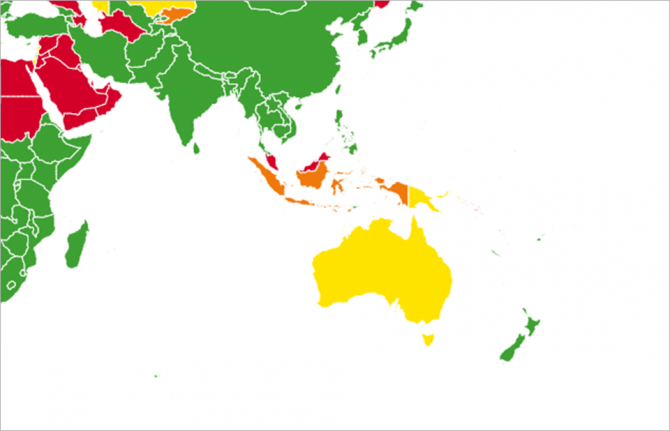
Press Statement
UNAIDS welcomes New Zealand’s decision to lift travel restrictions for people living with HIV
25 October 2021 25 October 2021GENEVA, 25 October 2021—UNAIDS welcomes the announcement by New Zealand that it has removed all travel restrictions for people living with HIV. The recent decision by Immigration New Zealand to remove HIV from the list of medical conditions deemed likely to impose significant costs or demands on New Zealand’s health services means that the blanket ban for people living with HIV to get a resident visa has officially been removed.
“I commend New Zealand for taking this important step and hope that it will encourage other countries to remove all travel restrictions and other policies that discriminate against people living with HIV,” said UNAIDS Executive Director, Winnie Byanyima.
Legislation, policies and practices that prohibit the movement of people living with HIV are discriminatory and frequently limit their opportunity to travel, work and study abroad. UNAIDS advocates for the right to freedom of movement and non-discrimination to end the inequalities faced by people living with HIV. There is no evidence that restrictions on the entry, stay or residence of people living with HIV protect public health.
With the removal of New Zealand’s restrictions, UNAIDS counts 46 countries, territories and areas that continue to impose some form of restriction on the entry, stay and residence of people living with HIV based on their HIV status.
UNAIDS
The Joint United Nations Programme on HIV/AIDS (UNAIDS) leads and inspires the world to achieve its shared vision of zero new HIV infections, zero discrimination and zero AIDS-related deaths. UNAIDS unites the efforts of 11 UN organizations—UNHCR, UNICEF, WFP, UNDP, UNFPA, UNODC, UN Women, ILO, UNESCO, WHO and the World Bank—and works closely with global and national partners towards ending the AIDS epidemic by 2030 as part of the Sustainable Development Goals. Learn more at unaids.org and connect with us on Facebook, Twitter, Instagram and YouTube.
Region/country

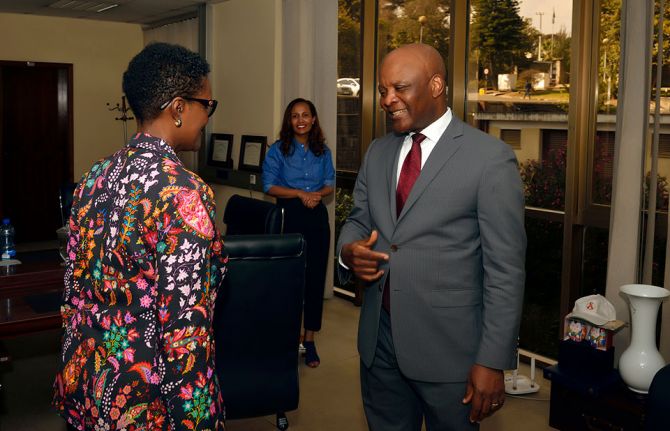
Press Statement
UNAIDS welcomes President Biden’s intent to nominate John Nkengasong as the new United States Global AIDS Coordinator
28 September 2021 28 September 2021GENEVA, 28 September 2021—UNAIDS warmly welcomes the intent of the President of the United States of America, Joe Biden, to nominate John Nkengasong as Ambassador-at-Large and Coordinator of United States Government Activities to Combat HIV/AIDS Globally at the Department of State.
One of the world’s leading pandemic experts, Mr Nkengasong is an HIV virologist with decades of experience in the global AIDS response and is the current Director of the Africa Centres for Disease Control and Prevention. He is an inspired choice to lead the United States President’s Emergency Plan for AIDS Relief (PEPFAR), the largest response in history by any nation to a single disease.
“John Nkengasong’s vast experience in combatting HIV, combined with his position as Africa’s leading disease expert fighting Ebola, COVID-19 and more, position him extremely well to guide the United States’ global contribution towards ending the AIDS pandemic,” said Winnie Byanyima, Executive Director of UNAIDS. “Today, the HIV and COVID-19 pandemics are colliding in communities throughout the world, and the threat of a resurgent AIDS pandemic is very real. We need the kind of bold thinking and commitment he has brought throughout his career.”
Previously, Mr Nkengasong was Acting Deputy Director, Center for Global Health, United States Centers for Disease Control and Prevention (CDC), and prior to that the Chief of the International Laboratory Branch, Division of Global HIV/AIDS and Tuberculosis, at the CDC. He also served as the Associate Director for Laboratory Science, Division of Global AIDS/HIV and Tuberculosis, Center for Global Health, CDC, and Co-Chair of PEPFAR’s Laboratory Technical Working Group. Mr Nkengasong has served as a member of the UNAIDS Advisory Group since 2019 and as the World Health Organization Director-General’s Special Envoy on COVID-19 Preparedness and Response since 2020.
Marking its 25th anniversary this year, UNAIDS has long partnered with PEPFAR and the Global Fund to Fight AIDS, Tuberculosis and Malaria to advance progress towards ending AIDS as a public health threat by 2030 as part of the United Nations Sustainable Development Goals.
UNAIDS is very grateful to the Acting United States Global AIDS Coordinator and Special Representative for Global Health Diplomacy, Angeli Achrekar, and her team, who have steered PEPFAR through a year of transition between administrations, and multiple pandemics, with urgency and expertise. Ms Achrekar will continue to lead PEPFAR through Mr Nkengasong’s Senate confirmation process.
UNAIDS
The Joint United Nations Programme on HIV/AIDS (UNAIDS) leads and inspires the world to achieve its shared vision of zero new HIV infections, zero discrimination and zero AIDS-related deaths. UNAIDS unites the efforts of 11 UN organizations—UNHCR, UNICEF, WFP, UNDP, UNFPA, UNODC, UN Women, ILO, UNESCO, WHO and the World Bank—and works closely with global and national partners towards ending the AIDS epidemic by 2030 as part of the Sustainable Development Goals. Learn more at unaids.org and connect with us on Facebook, Twitter, Instagram and YouTube.

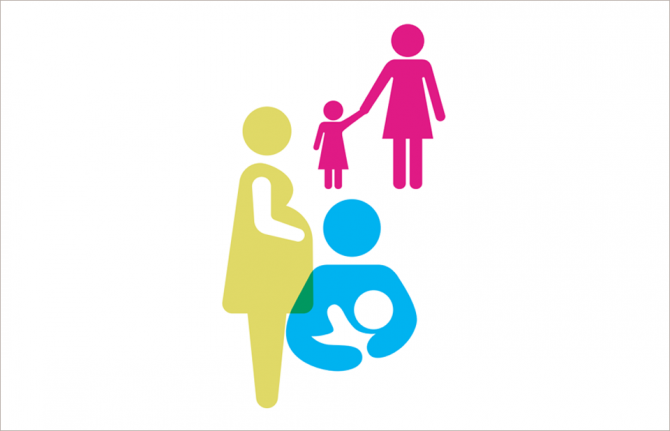
Press Statement
UNAIDS welcomes Chile’s recognition of responsibility for violating the rights of a woman living with HIV sterilized without her consent
11 August 2021 11 August 2021GENEVA, 11 August 2021—UNAIDS welcomes the announcement by Chile that it recognizes international responsibility for violating the rights of a woman living with HIV who was sterilized without her consent almost 20 years ago. The government has agreed a friendly settlement with the woman, Francisca, that includes the payment of reparations for the violation of her human rights. It has also committed to ending forced sterilization and to guaranteeing reproductive rights as human rights without discrimination.
Francisca delivered a healthy baby boy in 2002 and was then sterilized without her consent by the doctor who carried out her Caesarean section, making the decision that a woman living with HIV should not be able to have children. The friendly agreement announced this week comes after more than a decade’s litigation by the woman and her legal teams.
“This settlement is a significant moment for women around the world who have been fighting for reproductive justice for decades. Coercive sterilization of women living with HIV is a violation of women’s most fundamental human rights,” said UNAIDS Executive Director, Winnie Byanyima. “Unfortunately, this practice is still happening in many countries and efforts to stop it and bring justice to more women must be stepped up.”
This settlement comes after years of efforts before the Inter-American Commission on Human Rights (IACHR) after an earlier complaint in the Chilean justice system was unsuccessful. The case was litigated by the Chilean organization, Vivo Positivo, and the international human rights organization, Center for Reproductive Rights.
UNAIDS submitted an amicus brief to inform the IAHCR the standards that governments must uphold to address the HIV stigma and discrimination that impact women living with HIV. These include the obligation to respect, protect and fulfil women’s autonomy in decision making on matters related to their sexual and reproductive lives, their right to physical integrity and their right to be free from violence, including from violence by health personnel.
UNAIDS
The Joint United Nations Programme on HIV/AIDS (UNAIDS) leads and inspires the world to achieve its shared vision of zero new HIV infections, zero discrimination and zero AIDS-related deaths. UNAIDS unites the efforts of 11 UN organizations—UNHCR, UNICEF, WFP, UNDP, UNFPA, UNODC, UN Women, ILO, UNESCO, WHO and the World Bank—and works closely with global and national partners towards ending the AIDS epidemic by 2030 as part of the Sustainable Development Goals. Learn more at unaids.org and connect with us on Facebook, Twitter, Instagram and YouTube.
Our work
Region/country

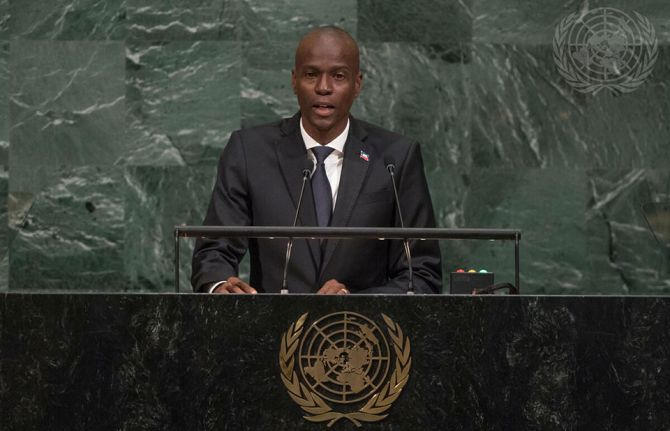
Press Statement
UNAIDS is shocked and saddened by the assassination of Jovenel Moïse, the President of Haiti
08 July 2021 08 July 2021GENEVA, 8 July 2021—UNAIDS is shocked and saddened by the assassination of Jovenel Moïse, the President of Haiti, during an attack by gunmen at his private residence. It also sends its sincere hopes that the First Lady, Martine Moïse, will recover from the injuries that she sustained during the incident.
“My thoughts are with the family of President Moïse at this incredibly difficult time,” said the UNAIDS Executive Director, Winnie Byanyima. “I sincerely hope that the First Lady will recover from her injuries. She is a strong friend to UNAIDS and a staunch champion in the response to the HIV epidemic, both in Haiti and across the region.”
Ms Moïse, above left, has chaired Haiti’s Global Fund to Fight AIDS, Tuberculosis and Malaria Country Coordinating Mechanism since 2017 and is a close ally of UNAIDS. She is also a member of the Spouses of Caribbean Leaders Action Network and champions its work around the Every Woman, Every Child initiative in Haiti. Among Ms Moïse’s priorities are combatting violence against women and girls, teen pregnancy and human trafficking. She also supports the agenda to prevent and eliminate mother-to-child transmission of HIV.
In June, Ms Moïse spoke on behalf of the Caribbean Community at the United Nations General Assembly High-Level Meeting on AIDS.
UNAIDS
The Joint United Nations Programme on HIV/AIDS (UNAIDS) leads and inspires the world to achieve its shared vision of zero new HIV infections, zero discrimination and zero AIDS-related deaths. UNAIDS unites the efforts of 11 UN organizations—UNHCR, UNICEF, WFP, UNDP, UNFPA, UNODC, UN Women, ILO, UNESCO, WHO and the World Bank—and works closely with global and national partners towards ending the AIDS epidemic by 2030 as part of the Sustainable Development Goals. Learn more at unaids.org and connect with us on Facebook, Twitter, Instagram and YouTube.
